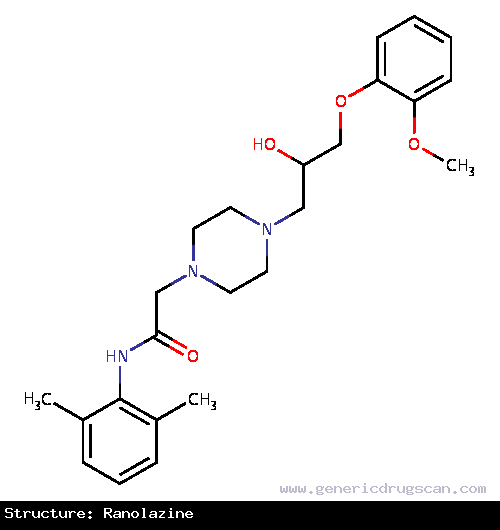Ranolazine Drug: Indication, Dosage, Precaution, Side Effect , Storage, Category Type and corresponding Brands - www.genericdrugscan.com
Ranolazine
Drug Status in USA : Approvedpronunciation
pronounced as (ra noe' la zeen)
Why is this medication prescribed?
Ranolazine is used alone or with other medications to treat chronic angina (ongoing chest pain or pressure that is felt when the heart does not get enough oxygen). Ranolazine is in a class of medications called anti-anginals. The exact way that ranolazine works is not known at this time.
How should this medicine be used?
Ranolazine comes as an extended-release (long-acting) tablet to take by mouth. It is usually taken with or without food twice daily. Take ranolazine at around the same times every day. Follow the directions on your prescription label carefully, and ask your doctor or pharmacist to explain any part you do not understand. Take ranolazine exactly as directed. Do not take more or less of it or take it more often than prescribed by your doctor.
Swallow the tablets whole; do not break, chew, or crush them.
Your doctor will probably start you on a low dose of ranolazine and gradually increase your dose.
Do not take ranolazine to treat a sudden attack of angina. Your doctor will tell you what you should do if you experience an attack of angina. Make sure that you understand these directions.
Ranolazine may help control your condition but will not cure it. Continue to take ranolazine even if you feel well. Do not stop taking ranolazine without talking to your doctor.
Ask your pharmacist or doctor for a copy of the manufacturer's information for the patient.
What are the precautions to be followed?
Before taking ranolazine,- tell your doctor and pharmacist if you are allergic to ranolazine, any other medications, or any of the ingredients in ranolazine extended-release tablets. Ask your pharmacist for a list of the ingredients.
- tell your doctor if you are taking any of the following medications: antifungals such as itraconazole (Onmel, Sporanox) and ketoconazole (Nizoral); clarithromycin (Biaxin, in Prevpac); medications to treat human immunodeficiency virus (HIV) or acquired immunodeficiency syndrome (AIDS) such as indinavir (Crixivan), lopinavir and ritonavir (Kaletra); nelfinavir (Viracept), ritonavir (Norvir, in Kaletra, in Viekira Pak, others), and saquinavir (Invirase); nefazodone; medications for seizures such as carbamazepine (Carbatrol, Equetro, Tegretol, others), phenobarbital, and phenytoin (Dilantin, Phenytek); rifabutin (Mycobutin); rifampin (Rifadin, Rimactane, in Rifamate, in Rifater); and rifapentin (Priftin). Also tell your doctor if you are taking St. John's wort. Your doctor may tell you not to take ranolazine if you are taking one or more of these medications or herbal products.
- tell your doctor and pharmacist what other prescription and nonprescription medications, vitamins, nutritional supplements, and herbal products you are taking or plan to take. Be sure to mention any of the following: amiodarone (Cordarone, Nexterone, Pacerone); antidepressants such as amitriptyline, clomipramine (Anafranil), and desipramine (Norpramin); and imipramine (Tofranil); medications to treat high cholesterol such as atorvastatin (Lipitor, in Caduet), lovastatin (Altoprev, in Advicor), and simvastatin (Zocor, in Simcor, in Vytorin); cyclosporine (Gengraf, Neoral, Sandimmune); digoxin (Lanoxin); diltiazem (Cardizem, Dilacor, Tiazac, others); dofetilide; (Tikosyn); erythromycin (E.E.S., Erythrocin, PCE); fluconazole (Diflucan);medications for mental illness such as haloperidol (Haldol), risperidone (Risperdal), thioridazine, and ziprasidone (Geodon); metformin (Fortamet, Glumetza, in Glucovance, others); quinidine (in Nuedexta); sirolimus (Rapamune); sotalol (Betapace, Sorine); tacrolimus (Astagraf, Envarsus XR, Prograf); and verapamil (Calan, Covera, Verelan, others). Your doctor may need to change the doses of your medications or monitor you carefully for side effects. Many other medications may also interact with ranolazine, so be sure to tell your doctor about all the medications you are taking, even those that do not appear on this list or the list above.
- tell your doctor if you have or have ever had liver disease. Your doctor may tell you that you should not take ranolazine.
- tell your doctor if you or anyone in your family has or has ever had a prolonged QT interval (a rare heart problem that may cause fainting or irregular heartbeat) or a fast, slow, or irregular heartbeat. Also tell your doctor if you have or have ever had an abnormal electrocardiogram (ECG: a test that records the electrical activity of the heart), low levels of potassium in the blood, or kidney disease.
- tell your doctor if you are pregnant, plan to become pregnant, or are breastfeeding. If you become pregnant while taking ranolazine, call your doctor.
- you should know that ranolazine may make you dizzy and lightheaded. Do not drive a car, operate machinery, or participate in activities requiring mental alertness and coordination until you know how this medication affects you.
What are possible side effects of this medication ?
Ranolazine may cause side effects. Tell your doctor if any of these symptoms are severe or do not go away:- nausea
- constipation
- headache
- dizziness
- fast, pounding, or irregular heartbeat
- difficulty breathing
- fainting
Ranolazine may cause other side effects. Call your doctor if you have any unusual problems while you are taking this medication.
How to store the medication and dispose it of after its use later?
Keep this medication in the container it came in, tightly closed, and out of reach of children. Store it at room temperature and away from excess heat and moisture (not in the bathroom).
Unneeded medications should be disposed of in special ways to ensure that pets, children, and other people cannot consume them. However, you should not flush this medication down the toilet. Instead, the best way to dispose of your medication is through a medicine take-back program.
Drug Category/Class
- Cardiac Therapy
- Sodium Channel Blockers
- Cardiovascular Agents
- Cardiovascular System
- CYP2D6 Inducers
- CYP2D6 Inducers (strong)
- CYP3A4 Inhibitors
- Other cardiac preparations
| Prescribed | For the treatment of chronic angina. It should be used in combination with amlodipine, beta-blockers or nitrates. |
| Weight : | 427.5365 |
| Structure | Ranolazine |
 | |
| Formula | C24H33N3O4 |
Ranolazine has 11 Brands listed
| Caroza (500 mg) | Cartinex (500 mg) |
| Rancad (500 mg) | Ranolaz (500 mg) |
| Ranolaz OD (500 mg) | Ranopill (500 mg) |
| Ranozex (500 mg) | Ranx ER (500 mg) |
| Revulant (1000 mg) | Revulant (500 mg) |
| Rolazin (500 mg) |
Search Generic Drugs alphabetically
